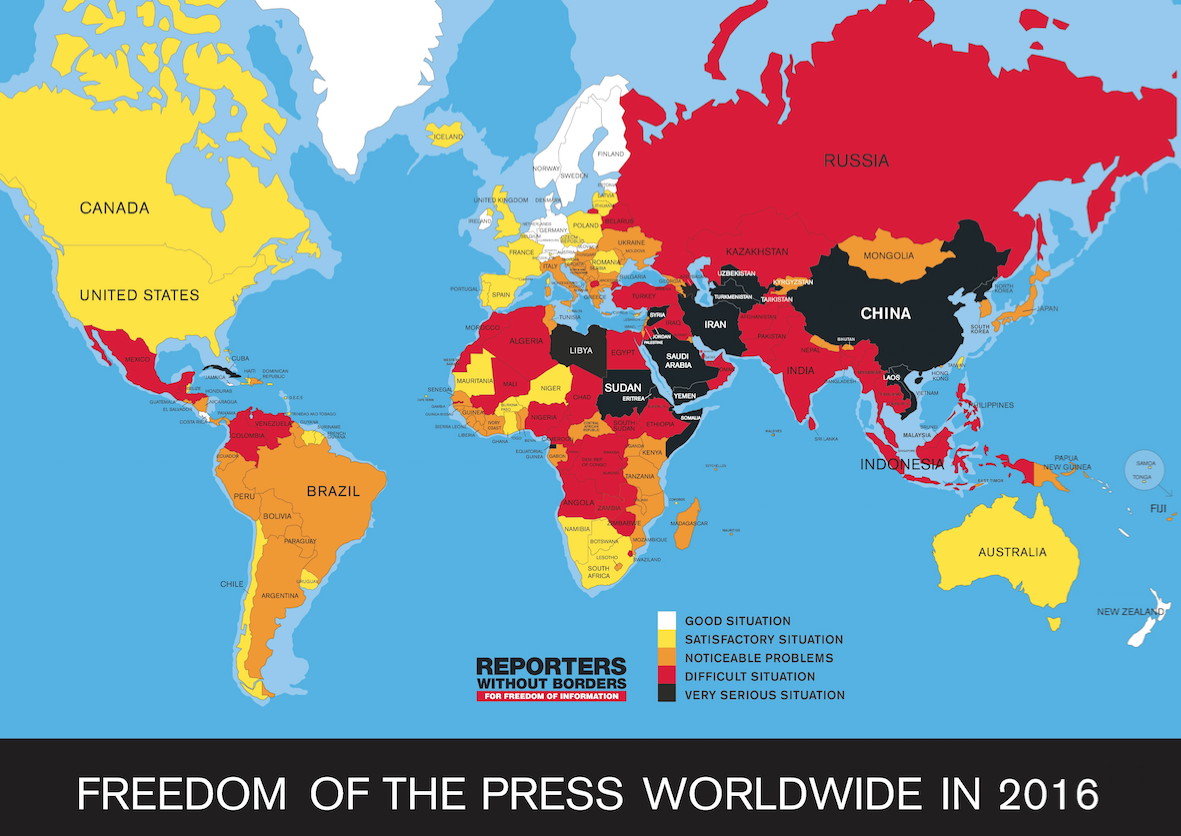| The 2016 World Press Freedom Index reflects the intensity of the attacks on journalistic freedom and independence by governments, ideologies and private-sector interests during the past year.
Seen as a benchmark throughout the world, the Index ranks 180 countries according to the freedom allowed journalists. It also includes indicators of the level of media freedom violations in each region. These show that Europe (with 19.8 points) still has the freest media, followed distantly by Africa (36.9), which for the first time overtook the Americas (37.1), a region where violence against journalists is on the rise. Asia (43.8) and Eastern Europe/Central Asia (48.4) follow, while North Africa/Middle East (50.8) is still the region where journalists are most subjected to constraints of every kind.
Three north European countries head the rankings. They are Finland (ranked 1st, the position it has held since 2010), Netherlands (2nd, up 2 places) and Norway (3rd, down 1). The countries that rose most in the Index include Tunisia (96th, up 30), thanks to a decline in violence and legal proceedings, and Ukraine (107th, up 22), where the conflict in the east of the country abated.
The countries that fell farthest include Poland (47th, down 29), where the ultra-conservative government seized control of the public media, and (much farther down) Tajikistan, which plunged 34 places to 150th as a result of the regime’s growing authoritarianism. The Sultanate of Brunei (155th, down 34) suffered a similar fall because gradual introduction of the Sharia and threats of blasphemy charges have fuelled self-censorship. Burundi (156th, down 11) fell because of the violence against journalists resulting from President Pierre Nkurunziza’s contested reelection for a third term. The same “infernal trio” are in the last three positions: Turkmenistan (178th), North Korea (179th) and Eritrea (180th).
“It is unfortunately clear that many of the world’s leaders are developing a form of paranoia about legitimate journalism,” RSF secretary-general Christophe Deloire said. “The climate of fear results in a growing aversion to debate and pluralism, a clampdown on the media by ever more authoritarian and oppressive governments, and reporting in the privately-owned media that is increasingly shaped by personal interests.
“Journalism worthy of the name must be defended against the increase in propaganda and media content that is made to order or sponsored by vested interests. Guaranteeing the public’s right to independent and reliable news and information is essential if humankind’s problems, both local and global, are to be solved.”
Published annually by RSF since 2002, the World Press Freedom Index is an important advocacy tool based on the principle of emulation between states. Because it is now so well known, its influence over the media, governments and international organizations is growing.
The Index is based on an evaluation of media freedom that measures pluralism, media independence, the quality of the legal framework and the safety of journalists in 180 countries. It is compiled by means of a questionnaire in 20 languages that is completed by experts all over the world. This qualitative analysis is combined with quantitative data on abuses and acts of violence against journalists during the period evaluated.
The Index is not an indicator of the quality of the journalism in each country, nor does it rank public policies even if governments obviously have a major impact on their country’s ranking. |


Teqera April 20, 2016
Thanks to the ignoramus to those Romantics who led us to this current hell and shame, in the name of al Huryet, a place called Eritrea. Eritrea has become last in every good manners but first in the worst cases such as free press, refugee production, number of jails, length of national slavery, number of prisoners, electric power, food and potable water supply.
Issaias Afaf once asked a journalist: what is free press?
Sol April 21, 2016
Dear Teqera, it is not fair and moralistic to insult the freedom fighters and their fathers and mothers who saw the struggle of their sons and daughters as a just struggle.
Teqera April 21, 2016
Sources from Eritrea indicate that the shoot-to-kill policy on Eritrean borders on young Eritrean would be refugees has recently intensified and many hundreds of Eritreans are dying in the hand of the Shifta regime of Eritrea.
When will the fifty years of killing and torturing Eritreans end? When will slavery and Abeedism end in Eritrea? When will Eritreans stop lying to themselves and others?